|
|
|
Sort Order |
|
|
|
Items / Page
|
|
|
|
|
|
|
| Srl | Item |
| 1 |
ID:
155144
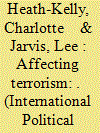

|
|
|
|
|
| Summary/Abstract |
The contemporary fascination with terrorism in Anglo-American popular culture, political discourse, news reportage, and beyond is boundless and well documented. In this article, we explore contemporary productions of terrorism as the outcome of three drives to knowledge: laugher, lamentation, and detestation. Drawing on a range of social and cultural practices—including jokes, street art, film, memorial projects, elite rhetoric, and abuse scandals—we make two arguments. First, that humor, grief, and hatred underpin and saturate the contemporary desire to know terrorism. And, second, that—although these drives function in multiple and ambiguous ways—they serve to institute a distance between the subject and object of terrorism knowledge, not least by encouraging us to laugh at those punished for terrorism, mourn for those lost in attacks, and direct our hatred toward those responsible. This analysis not only opens fresh insight into the workings of terrorism discourse in the post-9/11 period, it also points to connections between contemporary “critical” work on terrorism and debate on the role of emotions and affect in international politics more broadly.
|
|
|
|
|
|
|
|
|
|
|
|
|
|
|
|
| 2 |
ID:
151190
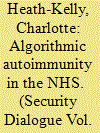

|
|
|
|
|
| Summary/Abstract |
This article explores the extension of counter-radicalisation practice into the National Health Service (NHS). In the 2011 reformulation of the UK Prevent strategy, the NHS became a key sector for the identification and suppression of ‘radicalisation’. Optometrists, dentists, doctors and nurses have been incorporated into counter-terrorism and trained to report signs of radicalisation in patients and staff. This article explores how calculative modalities associated with big data and digital analytics have been translated into the non-digital realm. The surveillance of the whole of the population through the NHS indicates a dramatic policy shift away from linear profiling of those ‘suspect communities’ previously considered vulnerable to radicalisation. Fixed indicators of radicalisation and risk profiles no longer reduce the sample size for surveillance by distinguishing between risky and non-risky bodies. Instead, the UK government chose the NHS as a pre-eminent site for counter-terrorism because of the large amount of contact it has with the public. The UK government is developing a novel counter-terrorism policy in the NHS around large-N surveillance and inductive calculation, which demonstrates a translation of algorithmic modalities and calculative regimes. This article argues that this translation produces an autoimmune moment in British security discourse whereby the distinction between suspicious and non-suspicious bodies has collapsed. It explores the training provided to NHS staff, arguing that fixed profiles no longer guide surveillance: rather, surveillance inductively produces the terrorist profile.
|
|
|
|
|
|
|
|
|
|
|
|
|
|
|
|
| 3 |
ID:
144877
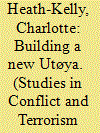

|
|
|
|
|
| Summary/Abstract |
Resilience strategies aim to build “resilience” before disasters strike; utilizing preemptive techniques to predict emergencies and prepare systems to manage their consequences. But what can we learn about resilience from responses to disasters that have already happened? This article draws on fieldwork at postterrorist sites in Norway: the Oslo Government Quarter and Utøya island. While resilience policy develops plans for infrastructural recovery after the next disaster, the curators of postterrorist sites rebuild and reclaim existing disaster space. They apply a retrospective framing of recovery. The article explores this work and questions its absence from policy understandings of resilience.
|
|
|
|
|
|
|
|
|
|
|
|
|
|
|
|
| 4 |
ID:
097739
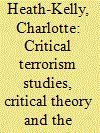

|
|
|
|
|
| Publication |
2010.
|
| Summary/Abstract |
This article problematizes how Critical Terrorism Studies (CTS) utilizes Coxian and Frankfurt School Critical Theory to support an emancipatory project. The article broadly takes the example of CTS to illustrate the dangers of the 'pearl fishing' method, occasionally used within critical international relations, where a section of a philosophical position is appropriated without regard for the whole. As Horkheimerian Critical Theory relies upon a far broader philosophy than CTS acknowledges, it is argued that the appropriated emancipatory foundation cannot make sense in soundbite form. Such stunted interaction with the wider philosophy of Critical Theory leaves CTS susceptible to the charge of logical error, specifically that contained in the 'naturalistic fallacy'. The naturalistic fallacy is a charge drawn from the philosophy of logic that takes improper derivation of 'ought' from 'is' within argumentation as its referent. The relationship between international relations and Critical Theory does not have to be so unsatisfactory, however, and this article concludes with suggestions for a route whereby emancipatory commitment might be adopted without such problems of normative origination.
|
|
|
|
|
|
|
|
|
|
|
|
|
|
|
|
| 5 |
ID:
184116
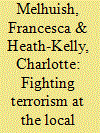

|
|
|
|
|
| Summary/Abstract |
In this article, we investigate how the EU mobilises a spatio-temporal imaginary of the “local” in its counter-radicalisation activities as a means of navigating subsidiarity principles and expanding its remit as a “holistic security actor” (cf. Baker-Beall [2016]. The European Union’s fight against terrorism: discourse, policies, identity. Manchester: Manchester University Press). Extant work on the EU’s terrorism prevention efforts has focused on how the organisation constructs transnational terror threats that require supranational, EU-level responses. Our research makes an original contribution to these literatures by demonstrating how the EU also seeks to intervene “below” the level of the nation state. EU counter-radicalisation works directly with subnational actors in municipalities, cities, and frontline public services across Member States. Employing the first systematic analysis of the EU’s Radicalisation Awareness Network (RAN) outputs, we demonstrate how “the local” frames pre-emptive counter-terrorism interventions as “upstream”. “Closer”, or “localised”, reads as “earlier” in this discourse. We also unpack how EU institutions and Member States have voiced concerns about the circumvention of subsidiarity (through engagement with local actors across the Union), by criticising the “effectiveness” of RAN. While the European Commission has taken steps towards addressing these grievances, its proposals reflect a further renegotiation and repositioning of the EU as a security “facilitator” across spaces deemed simultaneously local and transnational.
|
|
|
|
|
|
|
|
|
|
|
|
|
|
|
|
| 6 |
ID:
179317
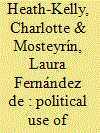

|
|
|
|
|
| Summary/Abstract |
Victims have become a topic of scholarly debate in conflict studies, especially regarding the impact of their activism on the evolution and termination of violence. Victims of terrorism are now enlisted within counter-terrorism, given their moral authority as spokespeople for counter-narratives and de-escalation. Our research explores how Spanish terrorism victims’ associations have evolved across eras of political violence and how they mediate the translation of international War on Terror discourses into Spanish counter-terrorism. We offer a topography of how the War on Terror has opened a ‘social front’ in Spanish counter-terrorism, with Spanish political elites prominently employing the victims’ associations to this end. Contemporary terrorism discourses are read back onto the memory of ETA, with victims’ associations assisting the equation of ETA with al-Qaeda and ISIS. Collective memory of the defeat of ETA has also contributed the veneer of ‘lessons learned’ to contemporary counter-terrorism measures. Our research explores the fluidity of terrorism-memory and the importation of global terrorism discourses into Spanish politics, relying upon interviews with key stakeholders in victims’ associations, local politics, and the research director of the new Victims of Terrorism Memorial Centre in Vitoria.
|
|
|
|
|
|
|
|
|
|
|
|
|
|
|
|
| 7 |
ID:
137016
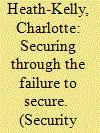

|
|
|
|
|
| Summary/Abstract |
Resilience discourses resignify uncertainty and insecurity as the means to attain security. Security failure is resignified as productive and becomes part of the story about security learning and improvements in anticipatory capability. In this article, I explore questions of failure mediation and ‘securing through insecurity’. If resilience policies suggest that failure and insecurity can be mediated and redeployed in the cause of success, what becomes of visceral sites of security failure such as the terrorist bombsite? This article focuses on a site where security agencies failed to prevent the bombing of a packed nightclub in Bali, in order to explore ambiguity of failure in the resilience era. It considers the efforts of politicians and activists to perform the site as resilient, and the spatial and temporal excess which eludes this performance. The article contributes to critical literatures on resilience by showing, through the ambiguities of resilience at the bombsite, that resilience is a chimera with regards to its supposed incorporation of insecurity.
|
|
|
|
|
|
|
|
|
|
|
|
|
|
|
|
|
|
|
|
|